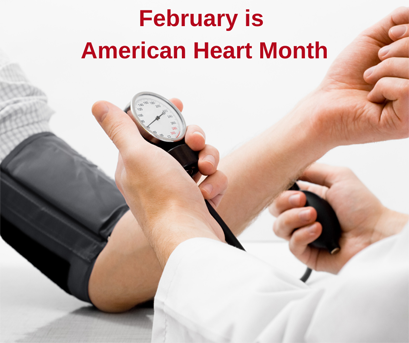Focus on the heart
January 27, 2022
February is American Heart Month. This year the CDC, and its “Division for Heart Disease and Stroke Prevention” is putting the focus on hypertension (high blood pressure), a leading risk factor for heart disease and stroke.
According to the CDC, approximately 45% of the U.S. has hypertension, and about 1/3 of those do not even know they have it. Hypertension is often referred to as the “silent killer”. Individuals usually do not have symptoms from high blood pressure until it has caused other serious health problems.
Some of the health problems that can be caused by uncontrolled high blood pressure include: aneurysm, stroke, heart attack, chronic kidney disease, damage to the eyes, dementia, and many more.
Blood pressure is made up of two numbers: systolic and diastolic. Systolic pressure is the pressure when the ventricles pump blood out of the heart. Diastolic pressure is the pressure between heartbeats when the heart is filling with blood.
Blood pressure changes throughout the day based on a person’s activities. For most adults, a normal blood pressure is less than 120 over 80 millimeters of mercury, which is written as your systolic pressure reading over your diastolic pressure reading—120/80 mm Hg. Your blood pressure is considered high when you have consistent systolic readings of 130 mm Hg or higher or diastolic readings of 80 mm Hg or higher.
Many factors can contribute to high blood pressure such as: age, lack of exercise, drinking too much alcohol, smoking or using illegal drugs, and not getting enough good-quality sleep. High blood pressure can run in families, or be a side-effect of some medications (antidepressants, decongestants, hormonal birth controls, and aspirin/ibuprofen). Other health issues like sleep apnea, thyroid problems, chronic kidney disease and others can also contribute to high blood pressure.
There are a variety of lifestyle changes that can help to lower blood pressure such as: eating less sodium (salt) and highly processed foods, getting more physical activity, aiming for a healthy weight, quitting smoking, cutting back on alcohol, and managing stress.
If lifestyle changes do not do the trick, there are many prescription medications available to help lower blood pressure. Consult with your medical provider to figure out which one is right for you.
If you’re curious about your blood pressure, you can call Mille Lacs Health System at 320-532-3154 to schedule a nurse visit at any of our clinics.
